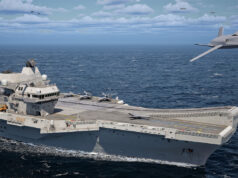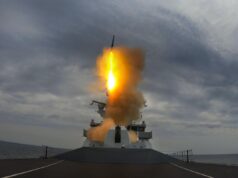Trident will be renewed no matter what Labour’s policy, the shadow Scottish Secretary has said. Ian Murray, who opposes Trident, said the Conservative majority at Westminster means a replacement for the system”will happen”.
Trident is a submarine-launched ballistic missile equipped with multiple independently targetable re-entry vehicles, currently the United Kingdom host these missiles on its Vanguard class submarines but as these are due to be replaced, let’s have a look at how much the replacement submarines will cost the UK over the programmes lifetime.
In an interview with The Herald, Mr Murray said Trident renewal “will happen”. The issue is reserved to Westminster.
SNP defence spokesman Brendan O’Hara, despite of a poll showing most Scots support Trident, said:
“If Mr Corbyn and Labour have any hope of being treated seriously by the vast majority of voters in Scotland, then he must get party support in his commitment to backing the SNP’s plan to scrap the replacement of Trident.”
It’s expected that the Successor submarines and their infrastructure will cost around £15 billion. This can be broken down as such:
- £0.25 billion to participate in the Trident D5 missile life extension programme.
- £11 billion for a class of four new submarines.
- £2 billion for possible refurbishing of the warheads.
- £2–3 billion for infrastructure (spent over 30 years).
There would be savings from a three-boat solution but these would not be in proportion to the reduction in the number of submarines.
“Of course, the deterrent is not cheap – no major equipment programme is. But our current nuclear weapons capability costs on average around 5-6 per cent of the current defence budget.†David Cameron, the Telegraph, 4 April 2013
According to a series of statements made in Parliament by ministers of the MoD, the annual operating costs of the Trident programme will indeed be around 5 to 6 per cent of the defence budget.
This means that the replacement submarines will have a running cost of around £2 billion per year, that may seem high but in defence terms, it’s relatively low as a single Type 45 Destroyer costs close to £1 billion to purchase let alone operate and fully arm.
The current annual spend on Trident is equivalent to less than 1 per cent of current health and education expenditure, this figure will be roughly the same for the replacement.
Estimates of the long term costs of big capital spends are notoriously hard to predict and can often fall or rise drastically. The costs associated with the programme are comparable to the procurement costs of major weapons systems such as Typhoon or Lightning aircraft.
Assuming the new submarines have a service life of 30 years, how much will it cost to run the submarines over their lifespan? Around £60 Billion spread over 30 years.
When the initial procurement costs are added on, the total programme cost will an estimated £75 billion however, £60 billion of this figure, as mentioned earlier, is spread over the lifetime of the vessels.













Good news it is a Dangerous world out there.
Interesting in how Politicians insist on telling us how dangerous a world we live in then cut our defence budget. Shameful double speak.
There is no cogent argument that can be made against renewing Trident.
Russia?
…is argument enough. It’s incredible how so many people think that Russia will respect the weak. Maybe the SNP will find that to their cost if Scotland ever become independent.
We need them more than ever with Muslims getting out of hand…
I support their renew, but the arguments here are just silly.
Let’s say we got rid out of deterrence, does anyone really think that Russia would suddenly go ok we can nuke them so lets do so, of course not. Not only because only the Americans were insane enough to use one killing civilians, but also if they did nuke us America, France, etc would counterstrike in fear of being hit next. The idea that Russia would take us less seriously is also flawed, its not military power that makes them take us serious, its economic power.
The argument of rogue states getting nukes, is also fundamentally flawed. We hear that these states are too unstable and so can’t be trusted to have nukes, but if this is true and they are seriously unstable, how is us having nukes going to stop them, nukes don’t take out nukes in the sky, we should be investing in anti-ballistic tech.
Considering the relatively tiny cost, against our tax income, I think we need them to stop us being blackmailed and generally feel safer, just like I lock my door when I go out, but I know in reality if someone actually wants to break into my house it won’t stop them, its there purely to make me feel better.
Just my 2cens
The biggest threat to the UK is from homegrown terrorism. This cant be fixed with nuclear weapons.
And for those that believe our tiny nuclear deterrent protects us from the Russians is kidding themselves. They have 7,000.
And why would Russia attack a small island off the coast of the EU.
Crazy.
Your argument here is perfectly valid and makes sense provided you are dealing with a rational foreign state. Unfortunately, Russia under Putin is not that state. The number of warheads is also irrelevant; nobody needs more than a few hundred warheads! The UK has enough to remove every major city in Russia. Putin will walk over anyone he believes is weak.
has to follow were developing ahead just like the us were running parrale,dates have been set and cannot be let to slip